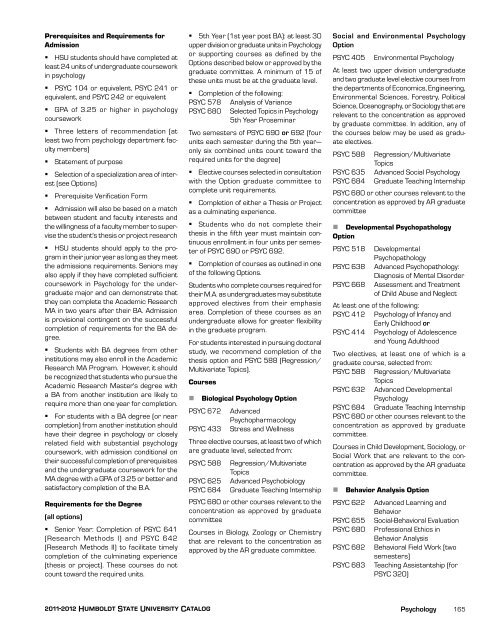2011-12 Academic Year - Bad Request - Humboldt State University
2011-12 Academic Year - Bad Request - Humboldt State University
2011-12 Academic Year - Bad Request - Humboldt State University
You also want an ePaper? Increase the reach of your titles
YUMPU automatically turns print PDFs into web optimized ePapers that Google loves.
Prerequisites and Requirements for<br />
Admission<br />
HSU students should have completed at<br />
least 24 units of undergraduate coursework<br />
in psychology<br />
PSYC 104 or equivalent, PSYC 241 or<br />
equivalent, and PSYC 242 or equivalent<br />
GPA of 3.25 or higher in psychology<br />
coursework<br />
Three letters of recommendation (at<br />
least two from psychology department faculty<br />
members)<br />
<strong>State</strong>ment of purpose<br />
Selection of a specialization area of interest<br />
(see Options)<br />
Prerequisite Verification Form<br />
Admission will also be based on a match<br />
between student and faculty interests and<br />
the willingness of a faculty member to supervise<br />
the student's thesis or project research<br />
HSU students should apply to the program<br />
in their junior year as long as they meet<br />
the admissions requirements. Seniors may<br />
also apply if they have completed sufficient<br />
coursework in Psychology for the undergraduate<br />
major and can demonstrate that<br />
they can complete the <strong>Academic</strong> Research<br />
MA in two years after their BA. Admission<br />
is provisional contingent on the successful<br />
completion of requirements for the BA degree.<br />
Students with BA degrees from other<br />
institutions may also enroll in the <strong>Academic</strong><br />
Research MA Program. However, it should<br />
be recognized that students who pursue the<br />
<strong>Academic</strong> Research Master's degree with<br />
a BA from another institution are likely to<br />
require more than one year for completion.<br />
For students with a BA degree (or near<br />
completion) from another institution should<br />
have their degree in psychology or closely<br />
related field with substantial psychology<br />
coursework, with admission conditional on<br />
their successful completion of prerequisites<br />
and the undergraduate coursework for the<br />
MA degree with a GPA of 3.25 or better and<br />
satisfactory completion of the B.A.<br />
Requirements for the Degree<br />
(all options)<br />
Senior <strong>Year</strong>: Completion of PSYC 641<br />
(Research Methods I) and PSYC 642<br />
(Research Methods II) to facilitate timely<br />
completion of the culminating experience<br />
(thesis or project). These courses do not<br />
count toward the required units.<br />
5th <strong>Year</strong> (1st year post BA): at least 30<br />
upper division or graduate units in Psychology<br />
or supporting courses as defined by the<br />
Options described below or approved by the<br />
graduate committee. A minimum of 15 of<br />
these units must be at the graduate level.<br />
Completion of the following:<br />
PSYC 578 Analysis of Variance<br />
PSYC 680 Selected Topics in Psychology<br />
5th <strong>Year</strong> Proseminar<br />
Two semesters of PSYC 690 or 692 (four<br />
units each semester during the 5th year—<br />
only six combined units count toward the<br />
required units for the degree)<br />
Elective courses selected in consultation<br />
with the Option graduate committee to<br />
complete unit requirements.<br />
Completion of either a Thesis or Project<br />
as a culminating experience.<br />
Students who do not complete their<br />
thesis in the fifth year must maintain continuous<br />
enrollment in four units per semester<br />
of PSYC 690 or PSYC 692.<br />
Completion of courses as outlined in one<br />
of the following Options.<br />
Students who complete courses required for<br />
their M.A. as undergraduates may substitute<br />
approved electives from their emphasis<br />
area. Completion of these courses as an<br />
undergraduate allows for greater flexibility<br />
in the graduate program.<br />
For students interested in pursuing doctoral<br />
study, we recommend completion of the<br />
thesis option and PSYC 588 (Regression/<br />
Multivariate Topics).<br />
Courses<br />
n Biological Psychology Option<br />
PSYC 672 Advanced<br />
Psychopharmacology<br />
PSYC 433 Stress and Wellness<br />
Three elective courses, at least two of which<br />
are graduate level, selected from:<br />
PSYC 588 Regression/Multivariate<br />
Topics<br />
PSYC 625 Advanced Psychobiology<br />
PSYC 684 Graduate Teaching Internship<br />
PSYC 680 or other courses relevant to the<br />
concentration as approved by graduate<br />
committee<br />
Courses in Biology, Zoology or Chemistry<br />
that are relevant to the concentration as<br />
approved by the AR graduate committee.<br />
Social and Environmental Psychology<br />
Option<br />
PSYC 405 Environmental Psychology<br />
At least two upper division undergraduate<br />
and two graduate level elective courses from<br />
the departments of Economics, Engineering,<br />
Environmental Sciences, Forestry, Political<br />
Science, Oceanography, or Sociology that are<br />
relevant to the concentration as approved<br />
by graduate committee. In addition, any of<br />
the courses below may be used as graduate<br />
electives.<br />
PSYC 588 Regression/Multivariate<br />
Topics<br />
PSYC 635 Advanced Social Psychology<br />
PSYC 684 Graduate Teaching Internship<br />
PSYC 680 or other courses relevant to the<br />
concentration as approved by AR graduate<br />
committee<br />
n Developmental Psychopathology<br />
Option<br />
PSYC 518 Developmental<br />
Psychopathology<br />
PSYC 638 Advanced Psychopathology:<br />
Diagnosis of Mental Disorder<br />
PSYC 668 Assessment and Treatment<br />
of Child Abuse and Neglect<br />
At least one of the following:<br />
PSYC 4<strong>12</strong> Psychology of Infancy and<br />
Early Childhood or<br />
PSYC 414 Psychology of Adolescence<br />
and Young Adulthood<br />
Two electives, at least one of which is a<br />
graduate course, selected from:<br />
PSYC 588 Regression/Multivariate<br />
Topics<br />
PSYC 632 Advanced Developmental<br />
Psychology<br />
PSYC 684 Graduate Teaching Internship<br />
PSYC 680 or other courses relevant to the<br />
concentration as approved by graduate<br />
committee.<br />
Courses in Child Development, Sociology, or<br />
Social Work that are relevant to the concentration<br />
as approved by the AR graduate<br />
committee.<br />
n Behavior Analysis Option<br />
PSYC 622 Advanced Learning and<br />
Behavior<br />
PSYC 655 Social-Behavioral Evaluation<br />
PSYC 680 Professional Ethics in<br />
Behavior Analysis<br />
PSYC 682 Behavioral Field Work [two<br />
semesters]<br />
PSYC 683 Teaching Assistantship (for<br />
PSYC 320)<br />
<strong>2011</strong>-20<strong>12</strong> <strong>Humboldt</strong> <strong>State</strong> <strong>University</strong> Catalog Psychology<br />
165

















